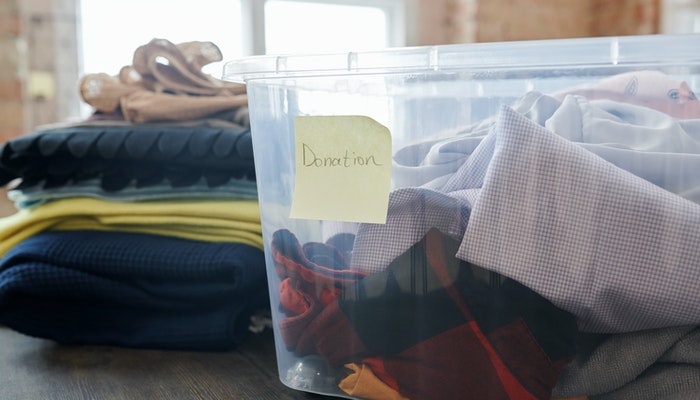Donation is one of the kindest virtues and it is an important lesson we must learn in childhood. Besides, it is a personal trait that helps us become generous and giving individuals. Cloth donations help needy individuals meet their basic clothing needs.
The lesser privileged section like war veterans, homeless, mentally challenged, physically abused, and sick people can directly benefit from your act of cloth Donation. Although cloth donation is an act of virtue, it does not mean that you are donating to DE-clutter your home or removing just the trash; in short, specific criteria need to be fulfilled.
Benefits or values of cloth Donation:
Cloth donation not only helps the unprivileged section but also helps in protecting the environment. The clothes that have become less valuable as it no more fit your grown-up child could be a valuable item for a homeless child. Again, there is no point in throwing such valuable items in bins to land up as trash or landfill. In short, when lesser items end up in landfills, it makes way for other trash and lesser production of new clothes.
The beauty of cloth donation is not confined to any particular age group, and not only kids but adults should also donate. As we grow, sometimes our taste changes, and a couple of times, we may not fit into the same clothing; hence opting to donate your favorite Shirt or suit does not go in vain. The one-time favorite suit of yours could be a lesser privileged one’s formal attrite in hitting an interview.
Although it may not be a suggestive idea for a kid but could be helpful for an adult. Quite often, adults are in a dilemma about the clothing they value but would hardly wear in the future; such clothing lies in the wardrobe and consumes space! Therefore donating cloth that is in good to wear condition is a helpful solution, as it will give you and your home a space to breathe!
Criteria for Cloth Donations:
One of the essential criteria for cloth donation is that the cloth should be free from stains, holes, and tears. In short, it is in good condition to be donated!
- Donate clothes that you wear no more as you feel it has gone out of fashion but are in good condition.
- Sometimes clothes no longer fit our body types; hence it is ideal to donate them instead of letting dust accumulate on them in the closet.
Not fitting for Donation:
Things you must not do when you want to participate in cloth donation are below:
- Intimate wear/ Undergarments: It is better not to donate your undies; no wonder how cute, sophisticated, or high-end they may be.
- Your favorites: A shirt or T-shirt may be your all-time favorite, but still, it is not fit for Donation if it has a hole. In such cases, it is ideal for repurposing it!
- Gently worn: It is better to donate clothes that are gently worn or are in almost new condition.
- The clothes that you are planning to donate must be odor free and stain-free. In case your clothes have stains try to remove them or take them to a professional.
- Recently washed and dry cleaned: All the clothes that you want to donate must be properly washed prior to donating them. Again some clothes that require dry-cleaning must be taken to a professional.
Pack up your clothes meant for Donation in a clean, damp-free covering to keep them free from mold and mildews.
Popular charitable Trusts to accept cloth Donation:
Here are some best places where you can go for cloth donation:
American Red Cross
One popular charitable trust that accepts cloth donations in the U.S is American Red Cross. It caters to cloth donations for disaster-hit victims both nationally and internationally.
Planet Aid
Planet Aid is a nonprofit organization that accepts clothing for men, women, and children, along with shoes and undergarments. They distribute donations, collaborate with local sports teams, assist nonprofit groups in fundraising, and educate young people about environmental conservation. To donate, locate a drop-off bin near you using the Planet Aid bin locator tool.
Dress for Success
It accepts all kinds of formal cloth wear for donation purposes and provides them to low-income women. It empowers the females to take up an active role in the service sector and comes as a boon to those who cannot afford expensive formal wear.
Big Brother Big Sister Foundation
The Big Brother Big Sister Foundation supports at-risk children with adult mentors to provide them with guidance and support. They accept all types of gently used clothing, and every penny from the proceeds goes directly to their charitable efforts. You can arrange for a convenient pick-up online via their website or drop off your donations at an authorized location.
Room to Grow
Parenting is tough, and when you speak of babies, it becomes difficult, especially for low-income individuals, to meet clothing requirements. The reason being babies outgrow their clothing quickest. Room for growth accepts all kinds of babies’ goodies, toys, and gear and offers them to low-income individuals.
GreenDrop
GreenDrop collects gently used clothing and household items to help nonprofit organizations and charities like the American Red Cross, Big Brothers Big Sisters, and the National Federation of the Blind. You can donate by scheduling a pick-up from your home or by dropping off your donations at a nearby center.
The Salvation Army
The Salvation Army is a charity that helps homeless people, elderly, veterans, and individuals through shelters and support services. To donate, you can drop off items at thrift stores or arrange a pick-up by calling them. The money raised from donations goes towards funding programs and services that support people in your community who need help.
Dress for Success
Founded in 1997, Dress for Success is a nonprofit organization to helping low-income women by providing them with professional attire. Operating in nearly 25 countries worldwide, the organization has supported over 1.3 million women. Jeanette Duffy, chief program officer at Dress for Success, explains that the organization assists women who lack suitable clothing for job interviews.
By providing the right attire, Dress for Success helps these women overcome initial job-seeking challenges and sets them on a path toward achieving career goals such as promotions, salary increases, and financial independence. To donate, visit Dress for Success’s website and schedule a drop-off appointment at a nearby location.
One Warm Coat
Consider donating your coats to One Warm Coat, a nonprofit organization that gives free coats to people in need. Since starting in 1992, One Warm Coat has organized 50,000 coat drives nationwide. Also, it has distributed 8 million coats through its nonprofit partners.
A warm coat can be a big help for families who are struggling financially. The goal is to provide warmth to those who need it most, and participating in coat drives lets you make a real difference in your community. To donate, use the locator tool on One Warm Coat’s website to find a nearby drop-off location.
Conclusion
Donations help foster generosity and compassion in donors and, at the same time, hope in the recipients. The clothes donated helps in improving the living condition of homeless, disaster, and diseased victims.
Before taking clothes to the donation center, do not forget to fix a schedule with the charitable organization accepting the same. Again, there are some national charitable organizations in the U.S providing pickup facilities on cloth offered for Donation. But in case you don’t have one in your area, you may have to opt for dropping the clothes near a local charitable trust in your own vehicle.
References:
- (https://www.marthastewart.com/8111390/best-places-donate-clothes)




